29 Nights | BLISSFUL SEAS
You will visit the following 21 places:

Tauranga
Tauranga is the most populous city in the Bay of Plenty Region of the North Island of New Zealand. It was settled by Māori late in the 13th century and by Europeans in the early 19th century and was constituted as a city in 1963. Tauranga is one of New Zealand's main centres for business, international trade, culture, fashion and horticultural science. The Port of Tauranga is also New Zealand's largest port in terms of gross export tonnage and efficiency. It is one of New Zealand's fastest growing cities, with a 14 percent increase in population between the 2001 census and the 2006 census, though that number has slowed to 11% between the 2006 Census and the 2013 Census.

Tahiti
Tahiti is the largest island in French Polynesia, the South Pacific archipelago. This overseas collectivity of the French Republic is sometimes referred to as an overseas country. The island was formed from volcanic activity and is high and mountainous with surrounding coral reefs. Tahiti was originally settled by Polynesians between 300 and 800 CE. They represent about 70% of the island's population with the rest made up of Europeans, Chinese and those of mixed heritage. The island was part of the Kingdom of Tahiti until its annexation by France in 1880, when it was proclaimed a colony of France. It was not until 1946 that the indigenous Tahitians were legally authorised to be French citizens. French is the only official language although the Tahitian language (Reo Tahiti) is widely spoken.

Pago Pago
Pronounced "Pahngo-Pahngo" in the Samoan language, Pago Pago is the territorial capital of American Samoa. In 2010, its population was 3,656. The city is served by Pago Pago International Airport. Tourism, entertainment, food, and tuna canning are its main industries. It is on the island of Tutuila.

Melbourne
Melbourne is the capital and most populous city in the state of Victoria, and the second most populous city in Australia. The Melbourne City Centre (also known as the "Central Business District" or "CBD") is the hub of the greater geographical area (or "metropolitan area") and the Census statistical division—of which "Melbourne" is the common name. As of June 2009, the greater geographical area had an approximate population of four million. In Southbank, the Melbourne Arts Precinct is site of Arts Centre Melbourne – a performing arts complex – and National Gallery of Victoria, displaying Australian and Indigenous art.

Apia
Apia is the capital and the largest city of Samoa. The city is located on the central north coast of Upolu, Samoa's second largest island. Apia is the only 'city' in Samoa and falls within the political district of Tuamasaga. Small in size with lovely attractions, Apia is very useful as an initial stop-off point for first time visitors to get their bearings, plan travel around the island of Upolu, organise accommodation on the beach, and recover from jet lag. The vast majority of Samoa's highlights can be found outside this town, although most are within a very short drive.

Brisbane
Brisbane is the capital and most populous city in the Australian state of Queensland and the third most populous city in Australia. The city central business district stands on the original European settlement and is situated inside a bend of the Brisbane River, about 15 kilometres (9 miles) from its mouth at Moreton Bay. The metropolitan area extends in all directions along the floodplain of the Brisbane River Valley between Moreton Bay and the Great Dividing Range, sprawling across several of Australia's most populous local government areas (LGAs), most centrally the City of Brisbane, which is by far the most populous LGA in the nation. Its positive attitude and creative confidence makes Brisbane a genuine new-world city. Even though the city is rapidly developing and forward-thinking, it maintains a youthful enthusiasm and has what is arguably the most vibrant, laid back and friendliest atmosphere of any east-coast capital city. It is also an energetic river town on the way up, with an edgy arts scene, pumping nightlife, and great coffee and restaurants!

Wellington
Wellington is the capital city and third most populous urban area of New Zealand. It's scenic natural harbour and green hillsides adorned with tiered suburbs of colonial villas are popular with tourists. The city offers a blend of culture, heritage, fine food and coffee, together with lively arts and entertainment. Surrounded by hills and a rugged coastline, it serves up a vibrant inner city experience with a slice of New Zealand scenery. And because of its compact nature, you can sample it all: boutiques, art galleries, trendy cafés and restaurants. Right on its doorstep is a network of walking and biking trails with beautiful wineries and vineyards just a few hours away.
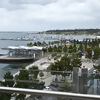
Geelong
Geelong is a port city located on Corio Bay and the Barwon River, in the state of Victoria, Australia. It is the second largest Victorian city, with an estimated urban population of 187,417 as at June 2015, having grown 1.8 percent since June 2014. The city runs from the plains of Lara in the north to the rolling hills of Waurn Ponds to the south, with Corio Bay to the east and hills to the west. Geelong City is also known as the 'Gateway City' due to its central location to surrounding Victorian regional centres. During the city's early years, an inhabitant of Geelong was often known as a Geelongite, or a Pivotonian, derived from the city's nickname of "The Pivot", referencing the city's role as a shipping and rail hub for the area. The city is known for being home to the Geelong Football Club, the second oldest club in the Australian Football League. Today, Geelong stands as an emerging health, education and advanced manufacturing hub.
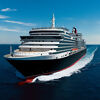
Suva
Suva is a major city, the capital and largest city of Fiji. It is located on the southeast coast of the island of Viti Levu, in the Central Division, Rewa Province, of which it is the administrative centre. It is the commercial and political centre of Fiji, though not necessarily the cultural centre, and the largest urban area in the South Pacific outside of Australia and New Zealand. It is Fiji's main port city. It's colorful, lively Municipal Market offers a vast range of local fruit and vegetables.

Port Vila
Port Vila is the capital and largest city of Vanuatu. Situated on the south coast of the island of Efate, in Shefa Province, the city population at last census (1999) was 29,356, an increase of 55% on the previous census result (1989). This suggests a 2007 population of about 40,000 or around 65% of the province's population. Port Vila is the economic and commercial centre of Vanuatu. The area occupied by Port Vila has been inhabited by Melanesian people for thousands of years. In 1606, the first Europeans arrived at the island, led by Pedro Fernández de Quirós and Luis Váez de Torres.
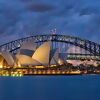
Sydney
Sydney is the largest and most populous city in Australia and the state capital of New South Wales. The city is located on Australia's south-east coast of the Tasman Sea. It is also the oldest and most cosmopolitan city in Australia with an enviable reputation as one of the world's most beautiful and liveable cities. Brimming with history, nature, culture, art, fashion, cuisine, design, Sydney's set next to miles of ocean coastline and sandy surf beaches. Long-term immigration has led to the cities reputation as one of the most culturally and ethnically diverse cities in Australia and the world. The city is also home to the Sydney Opera House and the Sydney Harbour Bridge, two of the most iconic structures on this planet.

Dunedin
Dunedin is the second-largest city in the South Island of New Zealand, and the principal city of the Otago Region. It is considered to be one of the four main urban centres of New Zealand for historic, cultural, and geographic reasons. Dunedin was the largest city by territorial land area until superseded by Auckland on the creation of the Auckland Council in November 2010. Dunedin was the largest city in New Zealand by population until about 1900. The Dunedin urban area lies on the central-eastern coast of Otago, surrounding the head of Otago Harbour. The harbour and hills around Dunedin are the remnants of an extinct volcano. The city suburbs extend out into the surrounding valleys and hills, onto the isthmus of the Otago Peninsula, and along the shores of the Otago Harbour and the Pacific Ocean.

Bora Bora
Bora Bora is an island in the Leeward group of the Society Islands of French Polynesia, an overseas collectivity of France in the Pacific Ocean. The original name of the island in the Tahitian language might be better rendered as Pora Pora, meaning "First Born"; an early transcription found in 18th- and 19th-century accounts, is Bolabolla or Bollabolla. The island, located about 230 kilometres (140 mi) northwest of Papeete, is surrounded by a lagoon and a barrier reef. In the center of the island are the remnants of an extinct volcano rising to two peaks, Mount Pahia and Mount Otemanu, the highest point at 727 metres (2,385 ft). Bora Bora is a major international tourist destination, famous for its aqua-centric luxury resorts. The island is served by Bora Bora Airport on Motu Mete in the north, with Air Tahiti providing daily flights to and from Papeete on Tahiti. The major settlement, Vaitape is on the western side of the main island, opposite the main channel into the lagoon.

Auckland
The Auckland metropolitan area in the North Island of New Zealand, is the largest and most populous urban area in the country with 1,354,900 residents, 31 percent of the country's population. Auckland also has the largest Polynesian population of any city in the world. In Māori Auckland's name is Tāmaki Makaurau, or the transliterated version of Auckland, Ākarana. The 2010 Mercer Quality of Living Survey ranked Auckland 4th equal place in the world on its list, while The Economist's World's Most Livable Cities index of 2010 ranked Auckland in 10th place. In 2008, Auckland was classified as an Alpha World City in the World Cities Study Group’s inventory by Loughborough University.

Moorea
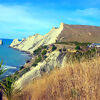
Napier
Napier is a New Zealand city with a seaport, located in Hawke's Bay on the eastern coast of the North Island. About 18 kilometres south of Napier is the inland city of Hastings. These two neighbouring cities are often called "The Bay Cities" or "The Twin Cities" of New Zealand. Napier is a popular tourist city, with a unique concentration of 1930s Art Deco architecture, built after much of the city was razed in the 1931 Hawke's Bay earthquake. It also has one of the most photographed tourist attractions in the country, a statue on Marine Parade called Pania of the Reef. Thousands of people flock to Napier every February for the Tremains Art Deco Weekend event, a celebration of its Art Deco heritage and history. Other notable tourist events attracting many outsiders to the region annually include F.A.W.C! Food and Wine Classic events, and the Mission Estate Concert at Mission Estate and Winery in the suburb of Taradale.

Urupukapuka Island
Urupukapuka Island is the largest island in the Bay of Islands of New Zealand, located about 7.3 km from Paihia. There are many sandy beaches. The waters around the island are clear and diving is particularly good on the east coast where there is plentiful reef life. Indico and Paradise Bays are popular sheltered anchorages and ideal for most forms of water sports. The bays are also inhabited by a colony of shags, and pohutukawas are abundant along the coastline.

Lautoka
Lautoka is the second largest city of Fiji. It is in the west of the island of Viti Levu, 24 kilometres north of Nadi, and is the second port of entry in Fiji, after Suva. Lying in the heart of Fiji's sugar cane growing region, it is known as the Sugar City.
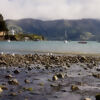
Akaroa County
Akaroa is a small town on Banks Peninsula in the Canterbury region of the South Island of New Zealand, situated within a harbour of the same name. The name Akaroa is Kāi Tahu Māori for "Long Harbour", which would be spelled "Whangaroa" in standard Māori. It is set on sheltered harbour and is overlooked and surrounded by the remnants of a miocene volcano. Akaroa is a popular resort town and in summer the temporary population can reach 15,000 which places stress on the summer water supply, which is entirely dependent upon rainfall on the hills.

Burnie
Burnie is a port city on the north-west coast of Tasmania. When founded in 1827, Burnie was named Emu Bay but it was renamed for William Burnie, a director of the Van Diemen's Land Company, in the early 1840s. At the 2011 Australian Census Burnie had an urban population of 19,819, making it the fourth largest city in Tasmania. Burnie together with nearby Wynyard had an estimated urban population of 26,869 at June 2015. Burnie is governed by the City of Burnie local government area.










